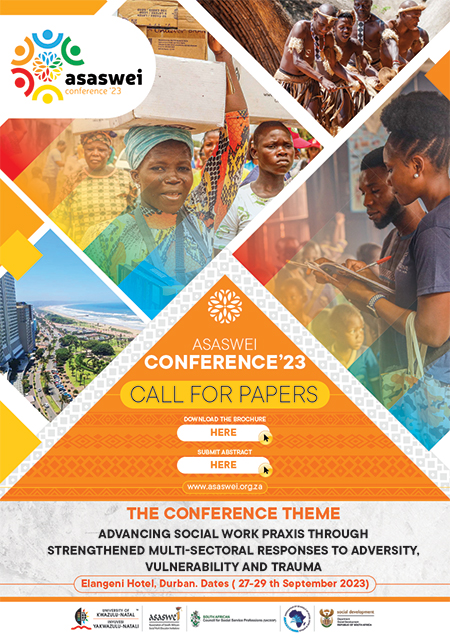The Table page displays a submission's general information and data using tabular layout. Watch video
Submission information
Submission Number: 46
Submission ID: 46
Submission UUID: 26ab91e1-736f-47fe-a0ca-c05d5c7c0e0f
Submission URI: /2023/abstracts
Created: Sat, 05/20/2023 - 17:43
Completed: Sat, 05/20/2023 - 17:47
Changed: Wed, 07/26/2023 - 22:31
Remote IP address: 72.36.119.114
Submitted by: Anonymous
Language: English
Is draft: No
Current page: Complete
Webform: Abstract
| Title | Dr. |
|---|---|
| Lastname | Kubanga |
| Firstname | Kefentse |
| [email protected] | |
| Mobile | + 1 205 239 8075 |
| Institution | The University of Alabama |
| Biosketch | Kefentse P. Kubanga is a PhD Candidate at the University of Alabama School of Social Work. Kefentse is interested in research on economic empowerment interventions. She is also a lecturer of Social Work at the University of Botswana. Her research examines the intersection of economic interventions and resilience among low-income populations. Kefentse is also interested in research around financial social work, microfinance, financial literacy and asset building for low-income populations. Her research also draws from her practice experience as a social welfare officer where she implemented psychosocial support services and programs for vulnerable individuals, families and communities in Gaborone, Botswana. |
| Is there a Second Presenter? | Yes |
| Title | Dr. |
| Lastname | Suntai |
| Firstname | Zainab |
| [email protected] | |
| Mobile | +1 917 717 8204 |
| Institution | Baylor University |
| Biosketch | Dr. Zee Suntai is an assistant professor at Bayor University’s School of Social Work. Her research focuses on the intersection of race and gender in palliative and end-of-life care. Her passion stems from her work with people diagnosed with chronic illnesses and is informed by the theory of intersectionality. In practice, she has previously worked in case management roles with people experiencing chronic illness and other comorbidities such as substance use, HIV, and mental illness. Her practice and research roles have also aimed to improve quality of life for caregivers, whose wellbeing undoubtedly impact the wellbeing of their care recipients. |
| Is there a Third Presenter? | Yes |
| Title | Dr |
| Lastname | Chipalo |
| Firstname | Edson |
| [email protected] | |
| Mobile | +1 518 360 7033 |
| Institution | Lewis University |
| Biosketch | Edson Chipalo is an assistant professor at Lewis University. Chipalo’s research area of interest focusses on examining the relationship between adverse childhood experiences and mental and other health outcomes for adolescents and youth in low income countries. Additionally, he also examines mental health and other resettlement factors among refugees in refugee camps and resettlement countries. |
| Title of Presentatation | 2. Exploring the Efficacy of Microfinance Interventions in Enhancing the Resilience of Low-Income Women in Botswana |
| Theme Selection | THEME 2: Building sustainable, resilient, and self-reliant communities through indigenous modalities, inter-sectoral collaborations, and partnerships |
| Subtheme TWO Selection | SUB 2.3 Strengthening indigenous economic empowerment structures in responding during and after adverse situations |
| Select your Presentation Type | Oral Presentation |
| Abstract | Financial empowerment of low-income populations has long been hailed as a strategy that could foster their long-term resilience. However, little is known about how which microfinance programs are associated with the resilience of low-income women in Botswana. Through the lens of the resilience theory, this phenomenological study explored resilience experiences of 19 low-income women enrolled in a microfinance program. Content analysis was adopted to develop themes around participants` strengths, talents, skills and personal traits they used to overcome adversity. The findings revealed that women`s strengths included being industrious, dexterous and caregivers, and talented in baking, sewing, crocheting and hairdressing. Religion and prayer were a source of hope during difficult times while their entrepreneurial skills were a means of survival. This study demonstrates that interdisciplinary collaborations between microfinance providers and human behavior practitioners could strengthen economic empowerment interventions to leverage on clients` positive attributes to respond to their non-financial needs. |
| Title | Prof |
| Firstname | Peto |
| Lastname | Botha |
| Does the Abstract fit the selected Theme? | Yes |
| What Area does this Abstract Focus on? | Practice |
| Status | Accepted |
| Title | Dr |
| Firstname | Nkosiyazi |
| Lastname | Dube |
| Does the Abstract fit the selected Theme? | Yes |
| What Area does this Abstract Focus on? | Practice |
| Status | Accepted |

